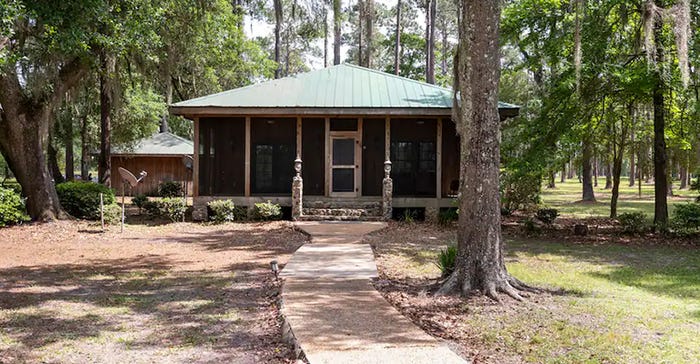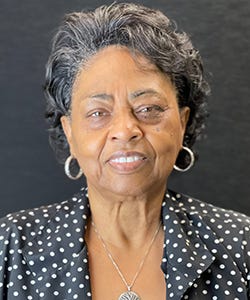Southwest Georgia Agri-Tourism Trail supports Black farmers, historic farmsSouthwest Georgia Agri-Tourism Trail supports Black farmers, historic farms
A partnership between New Communities Land Trust and Airbnb offers Black farmers a new income opportunity: tourism.
June 27, 2022

Shirley Sherrod, the former Georgia state director of rural development for the USDA, has spent much of her life championing Black farmers.
With her husband Charles Sherrod, she co-founded New Communities Inc., a nonprofit community land trust in Albany, Georgia, more than 50 years ago. Beginning during the civil rights movement, the trust helps African American families learn to produce revenue-generating crops while they advocate for social justice.
"My focus has always been farmers and rural communities here in southwest Georgia," says Sherrod, who was infamously and incorrectly forced out of her job—and later rehired by the USDA—after a mis-edited video clip sparked a national conversation on race and politics.
When Airbnb approached Sherrod about creating the Southwest Georgia Agri-Tourism Trail, a collection of stays and experiences with Black farmers, she jumped at the chance.
"We had thought about it for quite some time. But Airbnb reached out to me and we grabbed it right away," Sherrod says about the partnership. "This is helping open some doors to help [farmers] increase income from the land that they own so they can pay taxes and help their families survive."
The newly announced Southwest Georgia Agri-Tourism Trail currently includes a "Civil Rights Farm Tour" and a "Taste of the South" barbecue grilling class at The Vicks Estate as well as several cabins located at Resora, a 1,638-acre former plantation near Albany, Georgia—originally one of the largest slaveholder estates in the state, now operated by New Communities.

At least 12 properties will eventually be showcased, Sherrod says, but most farmers are still preparing their sites to be rental-ready properties.
"The New Communities is the original land trust in the U.S. with a collective of more than 6,000 acres owned and operated by Black farmers," says Haven Thorn, communications manager, North America for Airbnb. "The goal is to build generational wealth by supporting and educating its members on sustainable farming practices and agri-business." Long term, Airbnb and New Communities hope to create generational wealth for Black farmers by supporting and educating its members on sustainable farming practices and agri-business, Thorn says. The partnership also hopes to raise social awareness about the racial injustices and current needs of farming communities.
 "Many of the farmers have held on to their farms since their families acquired them after slavery ended, working together as sharecroppers to buy land to provide for their families," Sherrod says. "My hope is that some of the young people who left to live in cities will know the value of this wealth, this asset that's been passed down to them, and look at how they build on what was started many years ago to make it even more valuable."
"Many of the farmers have held on to their farms since their families acquired them after slavery ended, working together as sharecroppers to buy land to provide for their families," Sherrod says. "My hope is that some of the young people who left to live in cities will know the value of this wealth, this asset that's been passed down to them, and look at how they build on what was started many years ago to make it even more valuable."
In 2017, only 1.4% of farmers identified as Black or mixed race, compared with about 14% 100 years ago, according to the USDA's 2017 Census of Agriculture and McKinsey and Company, a management consulting firm. Black farmers make up just 6% of registered farmers in the South, the USDA reports. While Georgia has the fifth-highest number of Black farmers in the country, the state now has fewer than 3,000.
To introduce farmers in southwest Georgia to the idea of creating an agri-tourism trail, Sherrod says she took them on a bus tour to Milledgeville, Georgia, and along the coast of Georgia.
"We didn't have anywhere to show them in this region," she says.
Vacationing in rural areas is part of a larger trend since the COVID-19 pandemic. In 2021, domestic nights booked by U.S. guests on Airbnb for stays in rural areas grew 110% compared to pre-pandemic stays in 2019, with nights booked at farms stays increasing by 40% during that time period, Haven says.
"Airbnb hosts in rural counties, including farm stays, cabins, and places like Resora earned $3.5 billion last year, with the typical farm stay host in the U.S. is earning an average of over $10,000 in 2021," Haven says.
Clinton Vicks, the owner of Vicks Estate, Farm and Fishery and a high school communications teacher at South Georgia Regional Achievement Center in Albany, Georgia, was one of the farmers approached by New Communities and brought into the Southwest Georgia Agri-Tourism Trail.
 "When I heard Airbnb and agri-tourism, I instantly knew it would be a winner," says Vicks, who purchased Vicks Estate, Farm and Fishery in Albany, Georgia, in 2020. After spending nearly two decades in Washington, D.C., and New York working a variety of jobs television actor, trained opera singer and teacher, Vicks wanted to return to his hometown. Now he hopes to combine agriculture with his hospitality and entertainment interests.
"When I heard Airbnb and agri-tourism, I instantly knew it would be a winner," says Vicks, who purchased Vicks Estate, Farm and Fishery in Albany, Georgia, in 2020. After spending nearly two decades in Washington, D.C., and New York working a variety of jobs television actor, trained opera singer and teacher, Vicks wanted to return to his hometown. Now he hopes to combine agriculture with his hospitality and entertainment interests.
"All of those different career paths have culminated," says Vicks, who has a communications degree from Howard University. "When I decided to purchase a home, I saw the vast potential on this land." He started hosting agricultural and STEM learning sessions for students, helped by local science teachers who volunteer their time, and invited the local 4H out to his six-acre property, he says, for workshops and seminars.
"So many professional areas overlap and intersect with agriculture that offer opportunities for employment that students would never think of," he says. He's restoring a 4,000-square-foot farmhouse that he plans to rent out on Airbnb, on a property that includes three acres of natural forest, a fishing pond and farmland.
Vicks hopes to eventually add a hoop house and hydroponics. For now, he's focusing on "pesticide-free farming" on an acre of land with a no-till process to help maintain soil health while rotating seasonal crops that include tomatoes, watermelons, squash and a variety of greens such as Swiss chard and kale.
"One of the reasons why this is important to me is because I know my family history, to the 1800s, where agriculture was most prominent," says Vicks, a fifth-generation farmer. "This is a reconnection to my history and my past."
Vicks' parents and grandparents taught him how to plow, plant, harvest and cook. "It's a skill, a tradition and cultural aspect that we are losing because of the negative picture that comes to mind when we think about Blacks and farming and agriculture," he says. "It's seeing sharecroppers, tenant farmers and slaves. We haven't had a very positive introduction to begin with."
That changes once "you go back and actually learn the history of agriculture in this country," he says. "We are the ones that cultivated the soil," says Vicks, who recommends watching the Netflix documentary series, "High on Hog: How African American Cuisine Transformed America."
"You learn how the enslaved Africans hid seeds in their braided hair so when they got where they were going, they knew they would be able to feed themselves. That's how we get rice in America."
That's why being a farmer is so important to him.
"When you feed people, you have influence," Vicks says. "It's a multi-layered reason why this is so important. But if you want to talk about patriotism, I don't know what bigger patriot one can be than making sure the people of the nation are able to eat."
About the Author
You May Also Like





